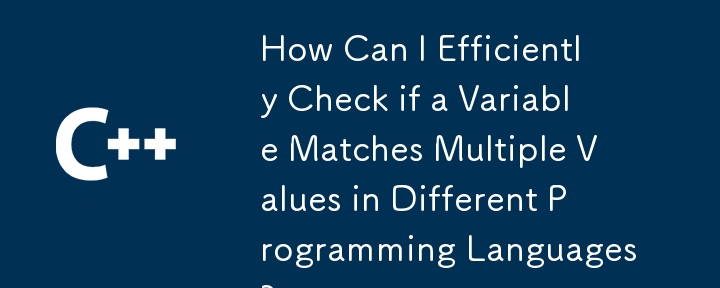 Backend Development
Backend Development
 C++
C++
 How Can I Efficiently Check if a Variable Matches Multiple Values in Different Programming Languages?
How Can I Efficiently Check if a Variable Matches Multiple Values in Different Programming Languages?
How Can I Efficiently Check if a Variable Matches Multiple Values in Different Programming Languages?
Jan 10, 2025 pm 01:02 PM
Elegantly handle multi-valued conditional judgments
Many programming languages provide conditional statements to evaluate whether a variable meets one or more conditions. When you need to check whether a variable meets a specific condition, you usually use multiple if statements nested, for example:
<code>if (value == 1) {
// value为1时执行的代码
} else {
if (value == 2) {
// value为2时执行的代码
}
}</code>This approach can become verbose and difficult to maintain when multiple values need to be matched. In SQL, this problem can be solved concisely using the IN operator:
WHERE value IN (1, 2)
In order to implement similar functions in common programming languages, developers usually use some clever tricks or extend the basic library. For example, you can use an array:
if (new[] { 1, 2 }.Contains(value)) {
// value为1或2时执行的代码
}Another solution is to define an extension method:
public static bool In<T>(this T obj, params T[] args) {
return args.Contains(obj);
}Using this extension method, you can write like this:
if (1.In(1, 2)) {
// value为1或2时执行的代码
}These techniques provide a more elegant way to express conditional checks on multiple values, improving code readability and maintainability.
The above is the detailed content of How Can I Efficiently Check if a Variable Matches Multiple Values in Different Programming Languages?. For more information, please follow other related articles on the PHP Chinese website!

Hot Article

Hot tools Tags

Hot Article

Hot Article Tags

Notepad++7.3.1
Easy-to-use and free code editor

SublimeText3 Chinese version
Chinese version, very easy to use

Zend Studio 13.0.1
Powerful PHP integrated development environment

Dreamweaver CS6
Visual web development tools

SublimeText3 Mac version
God-level code editing software (SublimeText3)

Hot Topics
 What are the types of values returned by c language functions? What determines the return value?
Mar 03, 2025 pm 05:52 PM
What are the types of values returned by c language functions? What determines the return value?
Mar 03, 2025 pm 05:52 PM
What are the types of values returned by c language functions? What determines the return value?
 C language function format letter case conversion steps
Mar 03, 2025 pm 05:53 PM
C language function format letter case conversion steps
Mar 03, 2025 pm 05:53 PM
C language function format letter case conversion steps
 What are the definitions and calling rules of c language functions and what are the
Mar 03, 2025 pm 05:53 PM
What are the definitions and calling rules of c language functions and what are the
Mar 03, 2025 pm 05:53 PM
What are the definitions and calling rules of c language functions and what are the
 Where is the return value of the c language function stored in memory?
Mar 03, 2025 pm 05:51 PM
Where is the return value of the c language function stored in memory?
Mar 03, 2025 pm 05:51 PM
Where is the return value of the c language function stored in memory?
 How do I use algorithms from the STL (sort, find, transform, etc.) efficiently?
Mar 12, 2025 pm 04:52 PM
How do I use algorithms from the STL (sort, find, transform, etc.) efficiently?
Mar 12, 2025 pm 04:52 PM
How do I use algorithms from the STL (sort, find, transform, etc.) efficiently?
 How does the C Standard Template Library (STL) work?
Mar 12, 2025 pm 04:50 PM
How does the C Standard Template Library (STL) work?
Mar 12, 2025 pm 04:50 PM
How does the C Standard Template Library (STL) work?








